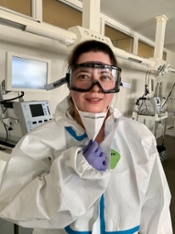 Daniela Martinez, B.S. '11, has always wanted to be a doctor. Yet nothing could have prepared the Venezuela native for working in a hospital in the time of COVID-19. Martinez, who studied microbiology and immunology at the University of Miami, completed her medical studies in Madrid, Spain, where she now works as an obstetrics and gynecology resident.
Daniela Martinez, B.S. '11, has always wanted to be a doctor. Yet nothing could have prepared the Venezuela native for working in a hospital in the time of COVID-19. Martinez, who studied microbiology and immunology at the University of Miami, completed her medical studies in Madrid, Spain, where she now works as an obstetrics and gynecology resident.
We touched base with Martinez to learn about the situation on the ground in Madrid, her journey as a doctor, and how she’s helping women cope as they navigate pregnancy and birth.
How are you, first of all?
Hello! I am doing well, all things considered. Times are stressful right now and we are required to adapt to new things every day. I am lucky that everyone in my family is healthy and doing well, and that I have a job I can continue doing.
Did you always want to become a doctor?
I am currently finishing my second year of residency in Obstetrics and Gynecology. I am absolutely in love with what I do. Caring for women throughout the different stages of their lives and being there for some of their happiest days is truly magical. I wanted to be a doctor since I can remember. I am Venezuelan and moved to Miami to study microbiology and immunology. I then decided to go to Medical School in Madrid, and I am still here doing my residency.
What does your day-to-day look like normally?
My day usually starts at 8 am at the hospital. The entire department meets and talks about relevant things that happened the day before. We receive new information from the head of the department, and twice a week there are presentations to keep our scientific knowledge up to date. Then I go to the consults where I see patients. It can include visits for pregnant women, ultrasounds, or a variety of gynecological issues. If I’m on call, I go to the Labor and Delivery unit. There, I see urgent care visits, deliver babies via vaginal births or cesarean sections, and treat obstetric emergencies.
What does the situation on the ground in Madrid look like?
The situation in Madrid has been scary. We had a really high number of people infected in a very short amount of time. Things are just starting to get better, after approximately 6 weeks of confinement. At my hospital, the patient capacity was tripled. We are a small hospital with 270 beds most of the time, and we have admitted up to 750 COVID patients at once. We have 8 ICU spots, and during the crisis, we had up to 33. Everyone is doing the best they can, often doing jobs that differ from their specialty and day-to-day jobs.
What has the experience working as a doctor in the time of COVID-19 been like?
I have always wanted to be a doctor. I never dreamed of doing anything else. I was never scared of the amount of work, the long hours, or treating sick people. This epidemic has been harder than I imagined. We go to work facing the possibility of getting sick with an unknown disease that has no treatment; we are not used to that.
But we have learned a lot during the past weeks. We have learned a lot about medicine, doing things we don’t usually do. We have learned that people step up to the challenge and do magnificent work. We have proven to be resilient and adapt to a thousand changes. We have witnessed the generosity of some people. We have learned the value of human contact.
As for myself, my work continues. Pregnancy doesn’t stop, babies need to be delivered regardless of the pandemic, and I am doing the best I can to help women forget all that is going on and focus on the beauty of becoming a mother.
